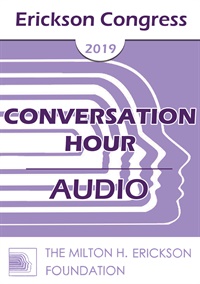
- Average Rating:
- Not yet rated
- Topic Areas:
- Workshops | Brief Therapy | Communication | Femininity | Masculinity | Couples Therapy | Relationships
- Categories:
- Brief Therapy Conference | Brief Therapy Conference 2006
- Faculty:
- Pat Love, EdD
- Duration:
- 2:29:51
- Format:
- Audio Only
- Original Program Date:
- Dec 10, 2006
- Short Description:
- A relationship can fail without conscious intent unless you understand the two major forces underlying resentment and alienation. Come learn how one shift in perception and three simple techniques can create harmony and happiness at home and work. This workshop will include lecture, video, practical handouts, experiential exercise and discussion.
- Price:
- $15.00 - Base Price

- Average Rating:
- Not yet rated
- Topic Areas:
- Workshops | Brief Therapy | Gender | Masculinity
- Categories:
- Brief Therapy Conference | Brief Therapy Conference 2008
- Faculty:
- Jon Carlson | Matt Englar-Carlson, PhD
- Duration:
- 2:04:09
- Format:
- Audio Only
- Original Program Date:
- Dec 12, 2008
- Short Description:
- In this workshop, we will explore the unique emotional development of boys and men, the different ways men and women respond to psychotherapy, and the special psychological challenges men face, including their preoccupation with money, power, and competition, as well as their use of work, anger, isolation, substance abuse and sexuality to mask troubling symptoms like depression. Attendees will learn how to engage even the most therapy-resistant men through a highly active approach that normalizes, rather than pathologizes, their feelings, attitudes, and behavior. Videotapes examples of actual sessions will be used to understand how to work with men in therapy.
- Price:
- $15.00 - Base Price
Tags: Brief Therapy Gender Masculine

- Average Rating:
- Not yet rated
- Topic Areas:
- Depression | Workshops | Masculinity | Gender | Relational Life Therapy Model (RLT)
- Categories:
- Couples Conference | Couples Conference 2013 | Pioneers in Couples and Family Therapy
- Faculty:
- Terry Real, LICSW
- Duration:
- 1:25:11
- Format:
- Audio Only
- Original Program Date:
- Apr 19, 2013
- Short Description:
- This workshop addresses the often-overlooked crisis of male depression, affecting an estimated 11 million men. It examines how cultural stigma and rigid gender roles contribute to covert depression—masked by workaholism, substance use, withdrawal, and anger. The session introduces the concept of "compound depression," where men feel ashamed of their vulnerability. Strategies include therapy, medication, peer support, partner involvement, and building relational skills to break the silence and promote healing.
- Price:
- $15.00 - Base Price
Credit available - Click Here for more information
- Average Rating:
- Not yet rated
- Topic Areas:
- Keynotes | Continuing Education | Couples Therapy | Gender | Masculinity
- Categories:
- Couples Conference | Couples Conference 2018 | Online Continuing Education | Pioneers in Couples and Family Therapy
- Faculty:
- Terry Real, LICSW
- Course Levels:
- Master Degree or Higher in Health-Related Field
- Duration:
- 33:57
- Format:
- Audio and Video
- Original Program Date:
- May 05, 2018
- Short Description:
- A leading expert on male psychology shares insights on the evolving nature of masculinity, examining both progress and backlash in the cultural landscape. He encourages therapists to help men reconnect with vulnerability and emotions, using truth-based techniques to build healthy self-esteem and relational strength. The talk underscores the vital role of women therapists and the importance of clinical skill over gender in fostering meaningful therapeutic change.
- Price:
- $0.00 - $29.00

Credit available - Click Here for more information
- Average Rating:
- Not yet rated
- Topic Areas:
- Couples Therapy | Masculinity | Topical Panels
- Categories:
- Couples Conference | Couples Conference 2021 | Online Continuing Education | Pioneers in Couples and Family Therapy
- Faculty:
- Harville Hendrix, PhD | Terry Real, LICSW | Joseph Winn, MSW, LICSW, CST-S
- Course Levels:
- Master Degree or Higher in Health-Related Field
- Duration:
- 59 Minutes
- Format:
- Audio and Video
- Original Program Date:
- Jun 05, 2021
- Short Description:
- The panel examines shifting male roles in therapy and relationships, focusing on the move from traditional masculinity toward vulnerability, empathy, and equality. Speakers discuss the decline in male resistance to therapy, the importance of dismantling patriarchal norms, and the impact of race, class, and sexuality on masculine identity. Emphasis is placed on therapist self-awareness and promoting relational skills over rigid gender roles.
- Price:
- $29.00 - Base Price
- Average Rating:
- Not yet rated
- Topic Areas:
- Workshops | Masculinity | Relational Life Therapy Model (RLT) | Intimacy | Love
- Categories:
- Couples Conference | Couples Conference 2023 | Pioneers in Couples and Family Therapy
- Faculty:
- Terry Real, LICSW
- Course Levels:
- Master Degree or Higher in Health-Related Field
- Duration:
- 1:34:03
- Format:
- Audio and Video
- Original Program Date:
- May 05, 2023
- Short Description:
- This talk introduces key insights from "Us: Getting Past You and Me to Build a More Loving Relationship", focusing on the concept of “loving power”—a blend of assertiveness and cherishing. It examines how patriarchy and individualism contribute to relational trauma and offers strategies from Relational Life Therapy (RLT), including loving confrontation, trauma repair, and skill-building. Emphasis is placed on self-disclosure, humility, and cultivating authentic connection.
- Price:
- $59.00 - Base Price
Credit available - Click Here for more information
- Average Rating:
- Not yet rated
- Topic Areas:
- Great Debates | Gender | Masculinity | Femininity | Psychotherapy
- Categories:
- Evolution of Psychotherapy | Evolution of Psychotherapy 2017 | Online Continuing Education
- Faculty:
- Esther Perel, MA, LMFT | Marilyn Yalom, PhD
- Course Levels:
- Master Degree or Higher in Health-Related Field
- Duration:
- 1:21:00
- Format:
- Audio and Video
- Original Program Date:
- Dec 14, 2017
- Short Description:
- EP17 Great Debates 11 - Masculine/Feminine: Then and Now - Esther Perel, MA, LMFT and Marilyn Yalom, PhD Tennyson, in a nineteenth-century poem, expressed the firm belief in the difference between men and women. Man for the field and woman for the heart: Man for the sword and for the needle she: Man with the head and woman with the heart: Man to command and woman to obey. During the twentieth century, this doctrine of separate spheres was steadily eroded so that by now, in the Western world, woman are expected to use their brains as well as their hearts and men are encouraged to assume some of the roles previously allotted exclusively to women. This dialogue between Esther Perel and Marilyn Yalom will explore the challenges that men and women now face in assuming traits and roles of the opposite gender. Are we edging towards a more androgynous definition of gender and a multiplicity of gender identities? What are the lingering gaps in gender inequality? Is there a “crisis of mascu
- Price:
-
Sale is $29.00
price reduced from Base Price - $59.00
Credit available - Click Here for more information
- Average Rating:
- Not yet rated
- Topic Areas:
- Speeches | Gender | Femininity | Masculinity | Relationships
- Categories:
- Evolution of Psychotherapy | Evolution of Psychotherapy 2017 | Online Continuing Education
- Faculty:
- Marilyn Yalom, PhD
- Course Levels:
- Master Degree or Higher in Health-Related Field
- Duration:
- 1:00:05
- Format:
- Audio and Video
- Original Program Date:
- Dec 15, 2017
- Short Description:
- The prominence of women as friends would have surprised people living in the distant past and would still surprise people in certain parts of the world, where only male friendship is prized. Yet, if you ask Americans today whether men or women have more friends, the answer is likely to be women. I shall examine the ingredients that seem basic to women’s friendships and suggest ways in which friendships between women (and between women and men) may be the saving grace in our present lives. I shall also examine the concept of friendship more generally as it has been understood in the western tradition since Aristotle. What are the benefits of friendship? Is it possible to live well without friends? What can women learn from male friendships and men learn from female friendships?
- Price:
-
Sale is $29.00
price reduced from Base Price - $59.00

- Average Rating:
- Not yet rated
- Topic Areas:
- Keynotes | Community | Femininity | Gender | Masculinity | Social Issues | Psychotherapy
- Categories:
- Evolution of Psychotherapy | Evolution of Psychotherapy 1990
- Faculty:
- Betty Friedan
- Duration:
- 1 Hour 6 Minutes
- Format:
- Audio Only
- Original Program Date:
- Dec 16, 1990
- Short Description:
- The enormous changes brought about in the last 25 years by the women's movement and the sex role revolution have opened new possibilities and problems-sources of conflict and new strengths for women, men and families. There is a challenge now for psychotherapists to break through their own remnant stereotypes of feminine mystique, masculine mystique, and obsolete assumptions about family so that they may distinguish between personal and political pathology and help evolving women, men and families find and use more consciously their new strengths and confront real problems realistically.
- Price:
- $15.00 - Base Price

- Average Rating:
- Not yet rated
- Topic Areas:
- Conversation Hours | Ericksonian Hypnosis and Therapy Techniques | Gender | Masculinity | Psychotherapy
- Categories:
- Erickson Congress | Erickson Congress 2019
- Faculty:
- Rick Miller, MSW
- Duration:
- 54 Minutes
- Format:
- Audio Only
- Original Program Date:
- Dec 14, 2019
- Short Description:
- Learn Ericksonian principals for encouraging men to participate and enjoy psychotherapy. Utilize strategies for dealing with their own biases regarding difficult men. Expand definitions of healthy masculinity.
- Price:
- $15.00 - Base Price





